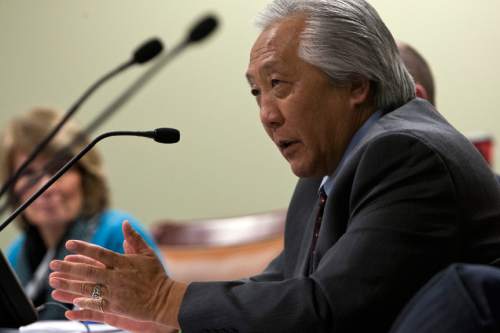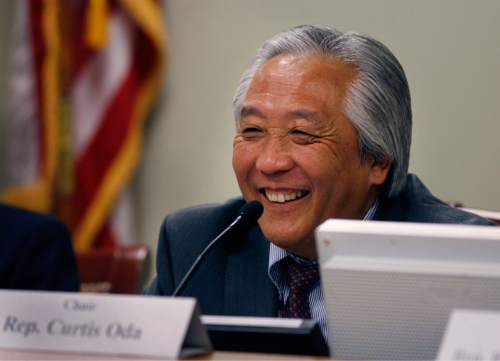This is an archived article that was published on sltrib.com in 2016, and information in the article may be outdated. It is provided only for personal research purposes and may not be reprinted.
The Utah Republican Party remains adamant that the best way to nominate candidates is through a convention by delegates chosen at neighborhood caucuses.
The delegates, they argue, are best suited to choose nominees because they can vet them during intimate candidate-delegate gatherings before the convention.
Critics counter that such a system ensures an exclusive group committed to controlling the process has too much power in picking candidates.
Now, it seems, some strident Republicans don't even believe the delegates should get a say. It should just be a coronation.
Consider the recent sleight of hand pulled off by veteran GOP legislator Curt Oda to ensure his handpicked candidate will be the only one with a chance to succeed him in House District 14 in the fall.
During the last days of the legislative session in March, Capitol rumors surfaced that Oda, R-Clearfield, did not plan to run for re-election, but instead would file for the seat to keep other hopefuls out, then have his "chosen one" file just before the deadline. After that, Oda would withdraw so his anointed successor could waltz in to the seat without GOP competition.
Some legislators, including Rep. Paul Ray, R-Clearfield, confronted Oda, who denied the rumor.
Guess what happened?
When the filing period opened March 11, right after the legislative session ended, Oda registered to run for a seventh term. Because he is such a well-known and politically established incumbent, his candidacy scared off potential Republican challengers.
Lo and behold, on the last filing day, March 17, Syracuse City Council member Karianne Lisonbee, known as a tea party firebrand, filed to run for Oda's seat.
A few days later, Oda withdrew.
Some Republicans, sensing the conspiracy at hand, did recruit another Republican, schoolteacher Dan Pitcher. But he is a political newcomer and the GOP handicappers are already conceding to Lisonbee who, by the way, heads the Davis County GOP ethics committee.
—
Et tu, Brute? • The Utah Democratic Party sent a letter March 22 to the lieutenant governor's office, demanding that a number of Republican candidates be banned from the ballot because they did not seek the number of signatures required by law to qualify.
The letter states those candidates cannot access the ballot through the caucus-convention system because the state GOP refuses to comply with the law that requires the party to include signature gatherers on the ballot.
That means, the complaint alleges, that the GOP is not a qualified political party, so the convention results don't count.
The Democrats gave the lieutenant governor a list of 119 candidates who have filed but should be disqualified for not following the guidelines.
Alas, two names on the list are Democrats — Heidi Redd, who is running in state Senate District 27, and Angela Urrea, who is running in state House District 29.
Don't Utah Democrats have a hard enough time getting elected without their own party trying to get them dumped from the ballot?
—
Lawmakers or lawbreakers? • Leaders from across the state convened recently for a League of Cities and Towns conference in St. George.
During a keynote session with hundreds of elected officials in the room, the topic of taxes on Internet sales came up. More than 100 of these trusted officials were given anonymous clickers to answer questions and watch the results come up on the screen.
When asked if they pay sales taxes on Internet sales by disclosing it on their tax returns — as required by law — more than 80 percent said no.
They were quickly reminded that state Auditor John Dougall was in the room, rolling his eyes.
Dougall told me later he wasn't rolling his eyes at the elected officials as much as he was at the Utah Tax Commission for doing such a lousy job educating the public about the obligation to pay Internet sales taxes.
Dougall opposed the recent failed bill that would have required Internet sales companies to collect and pay the state sales taxes. He said the burden should not be on companies with no nexus to Utah. It should be on the taxpayers.
Utah loses an estimated $80 million to $350 million a year in unpaid sales taxes from Internet commerce.





